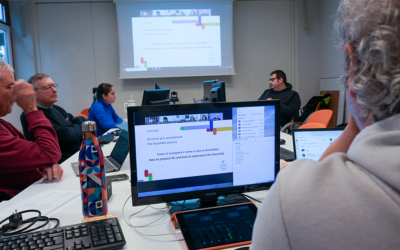The image of Brazil in the world today, partly thanks to the media, risks being a country saturated by political and ideological disagreements. Luís Henrique Marques, editor-in-chief at Cidade Nova magazine, shows us around Brazilian society, uncovering an often-unknown truth: many there act in favour of the common good. Going by what the commercial media broadcast each day, Brazil seems immersed in political and ideological polarization, much like other areas around the globe. But what the mainstream media does not show is that the situation in Brazil is not just made up of political or ideological conflicts. The quiet actions of many “pioneers” of this still-young, inexperienced democracy show that there is the potential to make political relationships a space to dialogue and a place to build up its citizenry. Cidade Nova magazine is one of the channels committed to covering this unknown side of the Brazilian situation, which is still a bit new and limited to isolated facts. Yet altogether, it shows a Brazil beyond the political and ideological divide. Space for dialogue To start we need to recognise that despite the crisis created by polarized positions in the political and ideological debate, many experts tend to see Brazil hopefully and optimistically. The main reason for this is that many Brazilian citizens are interested in understanding and discussing political questions and those relating to governing. They are convinced they need to take on their roles as citizens, fully knowing and participating when it comes to “public stuff”. “Dialogue groups”, as they’re called, have increased and multiplied. They have been promoted by parishes or Catholic pastoral groups, groups from other Christian churches and other religions (including ecumenical and interfaith projects), nongovernmental organisations, collectives and other organisations in civil society. The goal is to promote political reflection through dialogue and an exchange of experiences. This particularly increased during the second half of 2018, following the election cycle. These are small “islands”, yet they reflect the potential of Brazil’s citizens to participate in democracy. This is definitely the case for Focolare groups throughout the various areas of Brazil. Driven by a specific issue, young people and adults of various religious and political beliefs, and from a number of social backgrounds, began a discussion on the current political situation, its hurdles and possibilities. Many of these meetings went beyond the discussion about the electoral process and opened up to practical actions promoting politics that favour the local community.  The “Citizenship School”, also promoted by Focolare, is an online course whose topics respond to the wider questions of a new culture of participatory democracy. The first block of lessons covers the subject of dialogue (focolares.org.br/escoladecidadania). Another project – the “Pact for Democracy” – came out of a collaboration between various civil organisations in Brazil, including the for Movement for Politics and Policies for Unity. It began with the aim to support pluralism, tolerance and coexistence in diversity throughout society, and works in three directions. Firstly, it reaffirms dialogue as a virtuous comparison of ideas. Secondly, it defends fair elections so that they can effectively represent citizens and restore the foundations of trust and validity to the political context. Thirdly, it aims to establish wide political reform at the end of the electoral process. Finally, the traditional “fraternity campaign”, which is promoted annually by the Brazilian bishops conference during Lent, has become a space to dialogue and promote real action in parish communities concerning religious, cultural, social, economic and political issues in Brazilian society. This year, the campaign proposes the faithful reflect on the theme of “public politics and fraternity”. (continues)
The “Citizenship School”, also promoted by Focolare, is an online course whose topics respond to the wider questions of a new culture of participatory democracy. The first block of lessons covers the subject of dialogue (focolares.org.br/escoladecidadania). Another project – the “Pact for Democracy” – came out of a collaboration between various civil organisations in Brazil, including the for Movement for Politics and Policies for Unity. It began with the aim to support pluralism, tolerance and coexistence in diversity throughout society, and works in three directions. Firstly, it reaffirms dialogue as a virtuous comparison of ideas. Secondly, it defends fair elections so that they can effectively represent citizens and restore the foundations of trust and validity to the political context. Thirdly, it aims to establish wide political reform at the end of the electoral process. Finally, the traditional “fraternity campaign”, which is promoted annually by the Brazilian bishops conference during Lent, has become a space to dialogue and promote real action in parish communities concerning religious, cultural, social, economic and political issues in Brazilian society. This year, the campaign proposes the faithful reflect on the theme of “public politics and fraternity”. (continues)
Luís Henrique Marques




0 Comments